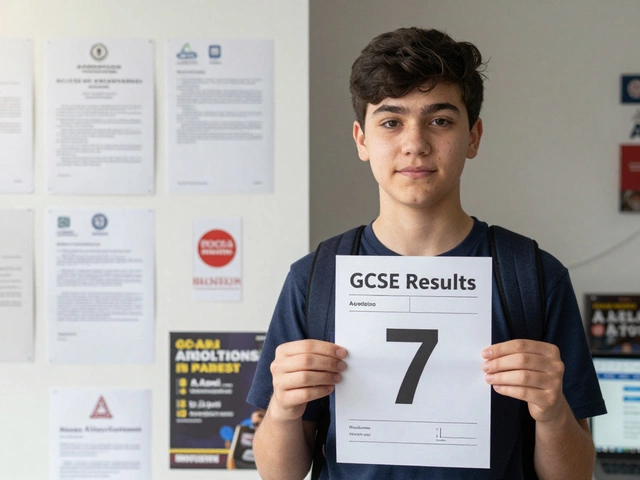Heard stories about US universities checking every little detail on your school record? It’s not quite so straightforward, especially when it comes to GCSEs. American colleges have their own way of sizing up applicants, and a set of UK exams can seem confusing to them at first glance.
If you’re worried your GCSE results could spoil your shot at a dream school—in the US, most colleges don’t even know what “GCSE” stands for right away. The way Americans look at your application depends on a lot of things: what kind of college it is, how competitive it is, and what else you bring to the table. Some top schools have gotten better at understanding the UK system, but it’s still not their usual way of judging a student.
So does that mean your GCSE grades don’t matter at all? Not exactly. A few colleges, especially the highly selective ones, might ask for your GCSE transcript. They’ll usually use it to check for patterns—like if you’ve always been strong in maths, science, or English. But you won’t find big checklists demanding nine A*s before you can get in the door. Instead, American colleges put way more weight on your last two years of study—so, your A-levels or the equivalent—and what you’ve been up to outside the classroom.
- What Are GCSEs and How Are They Viewed Abroad?
- How US University Admissions Work
- Do US Universities Really Look at GCSE Results?
- When GCSEs Matter for US Applications
- Tips for Students with Unusual Academic Profiles
What Are GCSEs and How Are They Viewed Abroad?
If you’re in the UK, GCSEs are just a regular part of teenage life. Students sit these exams at age 16, usually after two years of study. They cover core subjects like English, math, sciences, plus optional subjects like history or art. Grades go from 9 (the top) down to 1, with 4 seen as a standard pass. These results help decide what you can study at A-level, college, or in some cases, right into job training.
But if you cross the Atlantic, things change fast. US universities deal mostly with transcripts and report cards, not big ending exams like GCSEs. In the US, a student’s record is all about year-by-year performance from ages 14 to 18 (grades 9–12). There’s no direct equivalent to GCSEs in the American system. When admissions teams at US universities see “GCSE” on your paperwork, some have no idea what it means until they look it up or see extra explanations on your application.
Still, colleges care that you’ve finished core subjects that show you’re ready for more advanced study. Sometimes, they’ll treat your GCSEs as proof that you’ve covered the basics—similar to a US high school diploma up to sophomore year. Here’s a quick comparison:
| UK System | US System |
|---|---|
| GCSEs (age 16) | Grade 10 (age 16) |
| A-levels (age 18) | Grade 12 & SAT/ACT (age 18) |
Pretty often, international student offices at US universities have guides on their websites for understanding different country qualifications—including the GCSE. Sometimes, they’ll ask for extra info, like an official description of your school’s grading system or proof your GCSE grades mean what you say they mean.
For students applying from the UK, just expect you’ll need to explain a bit about these exams. Admissions teams want to see consistent effort and strong marks, but most don’t get hung up on every number as long as you’re on track for good A-levels or strong final grades before you graduate.
How US University Admissions Work
The US university admissions process looks nothing like the UK’s. There’s no central system, so you apply directly to each university. Most schools use something called the Common App—a huge online form where you upload everything from your grades to your activities, your essays, and recommendation letters. Some unis also have their own extra forms with quirky questions.
American colleges like to see the "whole person." That means your grades matter, but so do things like your sports, arts, jobs, and volunteer work. They call it a “holistic” review—basically, they want to understand who you are, not just how smart you look on paper.
Here’s what they usually check out:
- High school transcript (your reported grades and subjects for every year, not just final exams)
- Standardized test scores (SAT or ACT), though some schools made these optional now
- Essays—usually one big main essay plus some shorter ones
- Teacher and counselor recommendations
- List of outside activities, jobs, and leadership roles
For international students, including those with GCSE backgrounds, colleges ask for translated transcripts and sometimes more explanations so they can understand your education system. They’re used to seeing diplomas like the IB or APs, but less so UK-style GCSEs and A-levels—so you might need to explain things clearly.
| What Matters Most to US Universities? | About How Important? |
|---|---|
| Grades in last two years (A-levels, IB, AP) | Very High |
| Standardized Tests (SAT/ACT) | Medium to High* |
| Personal Essays | High |
| Recommendation Letters | Medium |
| Extracurricular Activities | Medium to High |
| GCSE Results | Low to Medium |
*Depends on whether the college is "test-optional" this year.
Bottom line: the US system looks at a big mix of things. Your grades leading up to finishing school have the biggest punch, but there’s a lot of room to stand out with what you do outside class and how you tell your story. GCSEs might show up on your transcript, but they’re not the only thing that counts.

Do US Universities Really Look at GCSE Results?
Here’s the truth: most US universities don’t put much weight on GCSE results. They get thousands of applications from all over the world, and their main focus is usually on what you’ve achieved in the last couple of years—think A-levels, International Baccalaureate, or other final qualifications. They like to see strong, recent academic performance above all.
That said, a few universities—especially the super-selective ones like the Ivy League schools or places like Stanford and MIT—will ask about your earlier grades. They use your GCSEs to spot trends: did you show promise early on? Have you improved over time? At these schools, GCSEs might come up as part of your overall application, but usually, they're not a deal-breaker.
This is what a Yale admissions officer said in an official FAQ:
"Yale doesn’t require any specific UK qualifications, but we do review applicants' GCSE and predicted A-level scores to get a sense of their academic history and readiness for university-level work."
So if your GCSEs are a bit shaky but your A-levels are strong, most American colleges are still interested in what you’re doing now. The high school transcript, which covers Years 12 and 13, is what gets the closest look.
Here’s a breakdown of how often US universities check GCSEs based on different types of schools:
| Type of University | Looks at GCSEs? |
|---|---|
| State colleges/less selective | Rarely |
| Competitive private universities | Sometimes (context only) |
| Top-ranking/Ivy League | Frequently (for patterns and context) |
Admissions teams are trying to see your growth, not punish you for a bad grade in Year 10 French. So if you’ve got a rough patch in your GCSEs, that’s not the end of your US college dream. Just be ready to explain it if asked, and focus on nailing your A-levels and showing what else you bring to the table, like leadership, hobbies, or work experience.
When GCSEs Matter for US Applications
You’ll find that US universities can treat GCSEs differently depending on the situation. For most state schools and lots of private colleges, your GCSE grades just aren’t a huge deal. But they do sometimes play a role—especially for top-tier universities or if your A-levels aren't quite in line with their expectations.
Let’s break down a few times when American colleges might look more closely at your GCSE results:
- Elite universities (think: Harvard, MIT, Stanford) want a full academic picture. They’ll often ask for your full secondary school transcript, which means you’ll be sending in your GCSE results along with A-levels or IB scores. They check for consistency and strong performance across a range of subjects.
- If you’re applying for a super competitive course, like engineering or pre-med, US admissions staff might look for strong maths and science scores in your GCSEs, just to make sure you’ve had solid groundwork.
- Should you be lacking in APs or Advanced classes, your GCSEs help fill in gaps. For example, if your school doesn’t offer APs, your strong GCSEs in relevant subjects signal you’ve been challenged academically.
Check out these well-known unis that will likely see your GCSE grades as part of the mix:
| University | Do They Ask for GCSEs? | How They're Used |
|---|---|---|
| Harvard | Yes | Looks for rigor and consistency in grades |
| Stanford | Yes | Assesses academic history as a whole |
| UCLA | Sometimes | May check if A-levels are missing specific info |
| NYU | Yes | Confirms eligibility and course prerequisites |
Here’s what makes your GCSEs matter even more: if you’re aiming for scholarships or academic programs where they want to see your full learning track. Also, if your A-level grades drop compared to your GCSEs, schools might ask for an explanation—and those earlier results will suddenly carry more weight.
Quick tip: Be ready to explain your grades if something changed between GCSEs and later studies. US admissions folks appreciate honest context, especially if you can show how you bounced back or took steps to improve.

Tips for Students with Unusual Academic Profiles
If your grades are all over the place or you've taken a non-traditional path through school, don't sweat it—US universities look at the big picture. They get plenty of international applicants who don't fit a neat mold, especially from systems with GCSE exams. What matters most is what story your application tells.
Here's some concrete advice if your academic record isn't cookie-cutter:
- Explain your unique story in your application essays. If you struggled in a year because of illness, family issues, or school changes, say so. Admission officers actually read these explanations, especially for international students.
- Highlight your strengths. If your GCSE grades in English and history rock, but science not so much, and you want to study English—point that out. Pick recommenders who can back you up, too.
- Share your highs, not just the numbers. Did you win a national writing contest? Were you captain of a sports team? US schools love seeing how you shine outside the classroom, and those things often outweigh mid-tier grades.
- Show your recent progress. The last two years of high school matter most, so if your A-levels or equivalent grades show big improvement, make that clear.
- Ask your school for a context letter. Some schools write a "school profile" or letter explaining grading quirks, subject options, or why certain scores look odd. US schools appreciate any extra info that explains your record.
One thing worth knowing: in 2023, over 20% of UK applicants to top-30 US universities had some form of interrupted or changed schooling in the past four years (according to the Fulbright Commission). So you’re not alone—and there’s more flexibility than you might think.
If you’re ever unsure about how your GCSE or academic journey stacks up, reach out to the university admissions office directly. They’re used to oddball transcripts and would rather get the full story than guess at gaps or odd marks.






